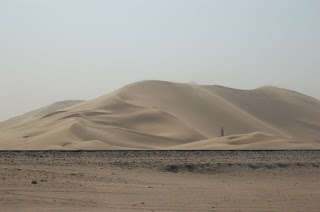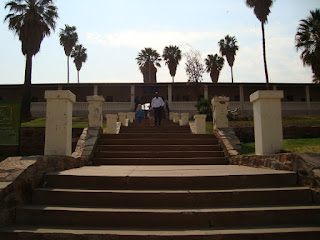This week marked the beginning of class wrap-ups, filled with lots of presentations and finishing assignments. Tuesday in Political Science class we continued our presentations, with groups presenting on democracy, African politics, apartheid, and the Basic Income Grant. The presentations ranged in creativity, from a game to a rap. That night, we had the Hour of Power swimming relay, in honor of Ted Mullin, our own Catherine Mullin’s brother. We were a part of the five continents that participated in the event, which is a fund and awareness raiser for Sarcoma cancer[1].
In Religion class this week we visited the Evangelical Lutheran Church in Namibia (ELCIN), which works with recent migrants to Windhoek, many of whom have relocated to the informal settlements. ECLIN’s major focus includes HIV/AIDs prevention, providing programs for Orphans and Vulnerable Children (OVCs), and income-generation. We visited a bread-baking project and a pre-primary school. It was great to see the support that religious organizations are providing to those in need, because of the extent to which we have studied religion, particularly Christianity, in Namibia, as well as the importance of NGOs. It is clear that ECLIN plays a central role in the informal settlements, providing services and advocating for those that are disadvantaged. ECLIN is primarily funded by the Finnish government, but is responsible for the allocation of such funds, and they emphasized the importance of development projects being managed by the community itself, a theme we have seen throughout the semester.

History class consisted of an anti-racism workshop, where Romanus had prepared several activities for us. They included defining racism, prejudice and bias, and giving serious thought to our encounters with and beliefs about racism. This also pushed us to think deeply about ‘white privilege’ and the extent to which it affects Southern African and American societies. This drew attention to the fact that while we conceptualize racism as historically being more prevalent in Southern Africa, it has been equally widespread in the US.
Friday’s Development class focused on health and its connections to development. We first visited the Roman Catholic Hospital. At the hospital we analyzed the differences between private and public healthcare. Speaking with nurses at the hospital, we learned about how the different facilities are funded, what services they have to offer, and how the healthcare professionals are educated. Following our visit to the hospital, we went to the home of Ms. Makhosi, a traditional healer.

Makhosi explained to us how her “gift” for healing works and her reliance on God to do her job. It was very interesting to learn about the various services she provides, including spiritual, mental, and physical healing. Even with the availability of Western medicine, the services of a traditional healer are still significant within Namibian society. We can see a significant contrast between the acceptance of holistic healing in the United States versus Namibia, due to the dominance of Western medicine in U.S. society. It was also apparent that religion and spirituality is important to Namibian traditional healing, which is very different from Western, scientific medical care.

On Saturday, I (Lizzie) arranged for Dr. King Holmes, head of public health at the University of Washington, to speak to some of the group about his role in global health today and in particular, his connections to the University of Namibia’s medical program. On Tuesday, Dr. Holmes will be unveiling a simulation laboratory at the University of Namibia. He highlighted on the idea that funding for medical research will soon start to shift from HIV/AIDS to maternal health. The most interesting part of the conversation was when Dr. Holmes asked us to connect our future careers to global health in some manner. We all realized that while we might not be studying medicine itself, our majors of development, international relations and conflict management all tie into global health in some form. This fits in well with the idea that we are all working on our integrative projects and connecting the ideas that we have learned in every class.
[1] Hour of Power Relay for Cancer Research. Carleton College, 13 November 2009. Web. 15 November






























